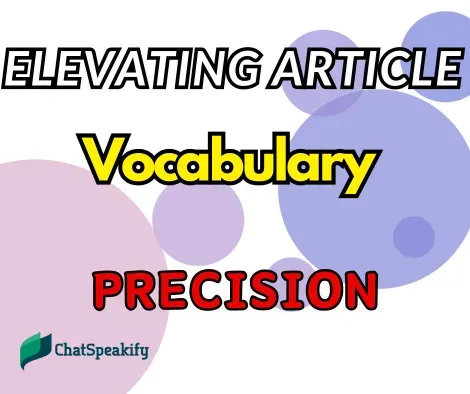Writing is about assembling words, expressing thoughts, and engaging with readers. We’ve established advanced guidelines and standards to help you write high-quality, captivating articles. Additionally, we provide a list of advanced words to avoid in IELTS Speaking and Writing, along with sophisticated alternatives, to help you further enhance your language precision and sophistication.
Introduction
Engaging Opening: Reflecting on my journey as a writer, I recall the evolution of my style. Initially, my work was riddled with overly simplistic words and phrases. Over time, I learned the art of word choice, which transformed my writing into something compelling.
Advanced Article Quality Guidelines
Experience: Share profound personal anecdotes or real-life stories that delve deeper into the human experience. These narratives should not only be relatable but also emotionally resonant, creating a strong connection with the reader.
Expertise: Incorporate cutting-edge research, advanced data analysis, and in-depth studies. Use specialized terminology appropriately, demonstrating a sophisticated understanding of the subject matter.
Authoritativeness: Reference highly reputable sources such as peer-reviewed journals, expert opinions, or comprehensive reports from leading institutions to enhance your content’s credibility.
Trustworthiness: Maintain transparency and honesty in your writing. Avoid any form of exaggeration or misrepresentation, and ensure all claims are substantiated with credible evidence.
High-Quality Article
Clear Structure: Begin with a captivating introduction, develop your ideas logically and cohesively in the body, and conclude with a powerful summary. Ensure seamless transitions between sections for an effortless reading experience.
Precise Language: Utilize precise and rich vocabulary. Avoid redundancy or overly convoluted expressions, and maintain impeccable grammar throughout the article.
Creative Expression: Infuse your writing with vivid examples, nuanced metaphors, and evocative stories. This technique helps illustrate your arguments compellingly and keeps readers engaged.
Keyword Coverage
Keyword Usage: Integrate major keywords naturally and contextually into your article. Avoid keyword stuffing or forced usage, which can disrupt the natural flow of the text.
Appropriate Context: Ensure that keywords are used in relevant and meaningful contexts, enhancing both readability and relevance.
Advanced Words to Avoid and Their Alternatives in IELTS Speaking and Writing
Refining your vocabulary and precision can significantly elevate your IELTS Speaking and Writing scores. Here are advanced words and phrases to avoid, along with sophisticated alternatives that will make your responses more impressive and articulate.
-
Really
-
Avoid: really interesting, really important
-
Use: captivating, vital
-
-
A lot of
-
Avoid: a lot of issues, a lot of influence
-
Use: numerous issues, significant influence
-
-
Things
-
Avoid: many things, complex things
-
Use: numerous factors, intricate elements
-
-
Stuff
-
Avoid: a lot of stuff
-
Use: various materials, multiple components
-
-
Like (as a filler)
-
Avoid: It was like, I was like
-
Use: It resembled, I felt
-
-
Get
-
Avoid: get better, get worse
-
Use: ameliorate, deteriorate
-
-
Nice
-
Avoid: nice idea, nice experience
-
Use: innovative idea, enriching experience
-
-
Kids
-
Avoid: kids
-
Use: adolescents
-
-
Big
-
Avoid: big opportunity, big impact
-
Use: substantial opportunity, profound impact
-
-
Bad
-
Avoid: bad effect, bad condition
-
Use: adverse effect, dire condition
-
-
Good
-
Avoid: good results, good outcome
-
Use: favorable results, optimal outcome
-
-
Important
-
Avoid: really important
-
Use: paramount, indispensable
-
Example Sentences
-
Instead of: “A lot of issues arise from this policy.”
- Use: “Numerous issues arise from this policy.”
-
Instead of: “She experienced a lot of stuff during her travels.”
- Use: “She encountered various experiences during her travels.”
-
Instead of: “Kids often need guidance to develop good habits.”
- Use: “Adolescents often require guidance to cultivate beneficial habits.”
-
Instead of: “It had a really big impact on the community.”
- Use: “It had a profound impact on the community.”
-
Instead of: “He has a really nice perspective on life.”
- Use: “He has an enriching perspective on life.”
Enhancing Vocabulary and Precision
By substituting these common and overused words with more sophisticated alternatives, you can demonstrate a broader and more advanced range of vocabulary. This not only elevates the quality of your language but also enhances your lexical resource score in the IELTS exam.
Final Tips
-
Consistency: Apply these changes consistently throughout your speaking and writing to leave a lasting impression.
-
Practice: Regularly practice using these advanced alternatives to become comfortable and fluent with them.
-
Feedback: Seek feedback from peers or mentors to ensure you are using these words correctly and effectively.
Improving your vocabulary and precision can greatly enhance the quality of your IELTS responses, making them more compelling and authoritative. Embrace the journey of continuous learning and refinement, and your writing will undoubtedly shine.
